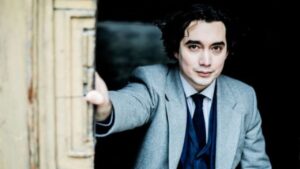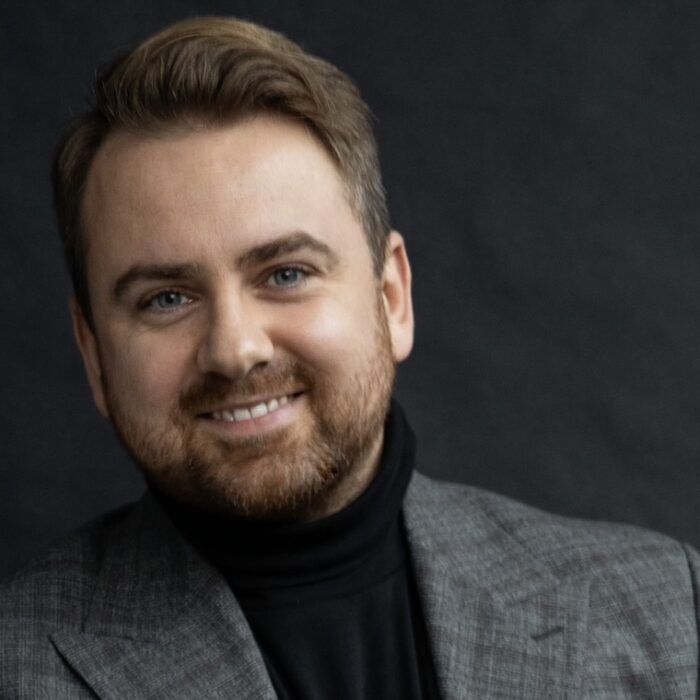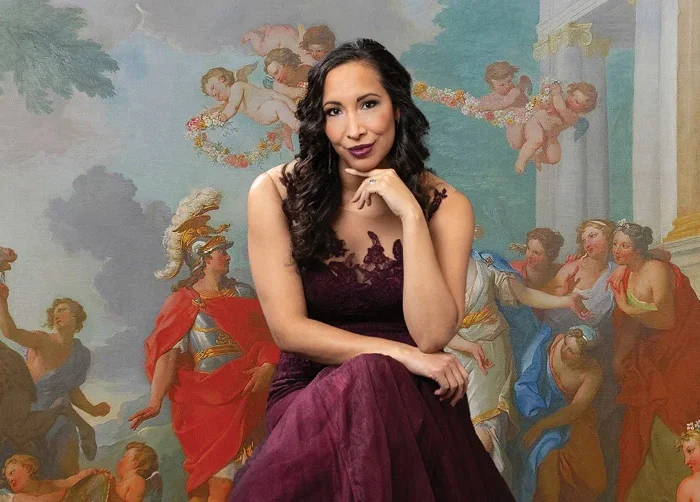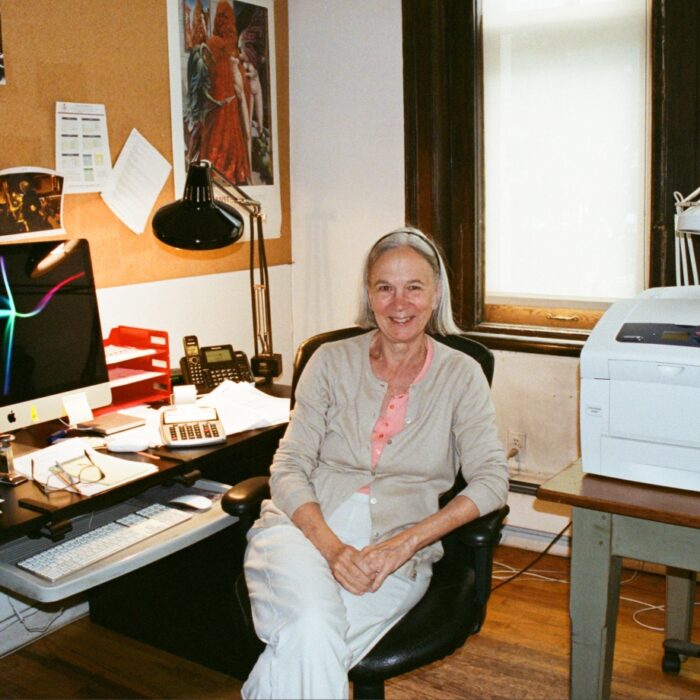
Q & A: Mikhail Timoshenko On His Opera Career & Philanthropic Path
By Mike Hardy(Photo: Annemone Taake)
Russian baritone Mikhail Timoshenko began his musical and theatrical training in Mednogorsk, then at the Franz Liszt University in Weimar and the Hans Eisler in Berlin. From 2015 to 2017, he was a member of the Académie de l’Opéra national de Paris. He sang in the world premiere of Joanna Lee’s “Vol Retour” and performed the role of Pluton (Monteverdi’s “L’Orfeo”). He has sung Spencer Coyle (“Owen Wingrave”), Hymas and Tirtée (“Les Fêtes d’Hébé”) in Paris and in London, Erster Handwerksbursch (“Wozzeck”), Silvano (“Un Ballo in Maschera”), Mitioukha (“Boris Godunov”) on the main stage of Bastille Opera.
His 2024-25 roles will include Papageno at Paris-Bastille Bastille, Marcello (“La Bohème”) at the Royal Opera House Covent Garden, “Kindertotenlieder” by Mahler in Toulon, Belcore (“L’elisir d’amore”) at the Opéra national de Lorraine, Taddeo (“L’Italienne à Alger”) at the Théâtre des Champs Elysées-Paris, and the title role of Don Giovanni and Tadeush (“La Passagère”) in Toulouse.
Philanthropy is a topic close to Mikhail’s heart. Since 2009, he gives charity concerts for children with mental disorders in Russia and takes part in several fundraising events organized by the “Yehudi Menuhin Live Musik” in Germany. In a cooperation with the autonomous non-profit organization ”Touch” in Orenburg he supports several boarding-schools for mentally handicapped children.
OperaWire visits with Mikhail Timoshenko to learn more.
OperaWire: Hello, Mikhail and thank you for speaking to OperaWire. You recently performed in Mozart’s “The Magic Flute” in Paris. How did the production go, and what do you make of Papageno?
Mikhail Timoshenko: Hello! It is my pleasure to speak to you. Absolutely marvelous! It was my first time performing Papageno with the German text (previously, I performed this role in Montpellier but without the dialogues), and everyone around could feel my excitement. Surrounded by colleagues of the highest quality, I was able to create an interesting and entertaining character who brought a lot of light, laughter, and compassion to the grand stage of the Opéra Bastille.
OW: You are about to perform at the Royal Opera House as Marcello in “La Bohème.” The last time you performed this role there, you received critical acclaim. What is it like to be back in London, and how are rehearsals going?
MT: I’m filled with pure and simple happiness. It might sound a bit exaggerated, but these are the words that best describe my return to the Royal Opera House. Being part of this big family, seeing friendly faces in the rehearsal rooms and offices, sharing ideas at the magnificent terrace where you can see the “thousand chimneys of London,” and creating together with the best of the best—it’s a life-changing experience every time.
OW: You have sung this role several times now. Are you fully comfortable with your characterization of Marcello, or is it still a work in progress? Who did you take inspiration from in the role?
MT: There is a saying: it’s not possible to step into the same river twice. Opera is a dynamic art form where everything and every moment is unique. Marcello began, for me, as an exploration, and now, together with the stage team and my colleagues, I draw inspiration from the persona of Modigliani. The beauty of opera is that everything remains flexible, and even between performances, there can be significant differences. All I can say with certainty is that I’m finally comfortable enough to feel free.
OW: Tell me about growing up in Russia, and who your musical influences were. Do you come from a musical family?
MT: I was born in a tiny village called Kameikino in an ordinary household. During my childhood, our family moved a lot, but my mother took great care of me and my younger brother, so I made a lot of friends who still remember me from those times. Everything changed when my brother was diagnosed with a severe form of autism. At the time, it seemed like a curse or a burden, but now I understand it was, and always will be, our blessing—my blessing. Perhaps because of this, my mother was so preoccupied with finding a “magic cure” for him that she didn’t encourage me to pursue music initially. Later, however, she supported me in attending the conservatory in Germany. I must also mention the heroism of my family: without knowing anything about classical music, they decided to believe in my dream. There’s a funny story about how I started singing, but that’s for another time.
OW: You established yourself as a singer of Mozart earlier in your career. How do you approach Mozart roles compared to, say, those by Puccini or Verdi?
MT: My goal is to grow alongside my vocal, physical, and emotional development. How do you decide if you’re ready for a certain role? Only through careful observation and constant work can you be granted what I might call a revelation. I’m not someone who holds rigid opinions about styles. While I possess knowledge about the differences in vocal and musical languages of each epoch, I don’t prioritize theory over reality. Mozart, Puccini, Donizetti, Bach, or Schönberg—there is only one way to approach every piece of music: careful observation and constant work. Observation helps you understand the composer’s ideas and emotions, while work brings them to life. For example, only after years of mastering the art song did I realize that I was ready to perform Schubert’s “Winterreise.” I am now preparing to present it at Wigmore Hall this summer.
OW: You have upcoming roles in Wagner’s “Les Grandes Pages: L’opéra Allemand,” Donizetti’s “L’elisir d’amore,” and Rossini’s “L’italiana in Algeri,” all, I believe, are role debuts. Is this a deliberate intention to explore and establish yourself in new roles?
MT: All of this. Agreeing to a role is the result of a complex mechanism inherent in being an opera singer today, especially in the freelance world. I can assure you that every role was chosen carefully, with the goal of delivering the highest level of performance for the audience. Behind each decision is an entire team, including my agent, my singing teacher, and my duo partner and wife, Elitsa Desseva. These choices come after many discussions, considering all aspects of selecting one path over another.
OW: You are clearly a committed philanthropist. I understand you have been giving charity concerts and campaigning for children with mental health issues. Can you tell me more about this and the charities and organizations you are involved with?
MT: I owe much of this to my little brother. He has given me the chance to be a better person. And I’m not just talking about helping him directly. This issue goes much deeper and touches on the very core of human existence. Until 2021, I held annual charity concerts in Russia, though it has become more complicated since then. My mother is the true hero in this story: for the past three years, she has run the first dom soprovozhdayushchego prozhivaniya (assisted living home) in the Orenburg region. She helps young people with mental disorders learn to live independently. I’m also part of a French organization called CALMS. Together with my colleagues in France, we raise awareness of social issues through charity concerts. Finding time for philanthropy in my schedule is challenging, but I give it my best and will never stop.
Categories
Interviews


